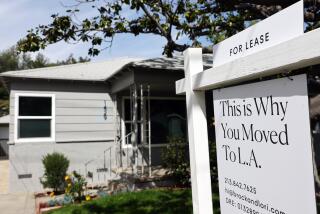Loans for a First Down Payment
QUESTION: My husband and I have intended to buy a house ever since the day we moved to California from Oklahoma. But that was over a year ago, and despite our best efforts to save money, we can’t seem to come up with a big enough down payment. We have thought about borrowing money for part of the down payment, but our incomes aren’t big enough to make payments on a mortgage and a second loan, too. And we’re both too stubborn to ask our parents for help. Do you know any lenders who will relax the rules for first-time home buyers or any other way couples in our situation solve the problem?--S. O.
ANSWER: The two solutions you already mentioned and ruled out are certainly the most obvious. And perhaps you have ruled them out too quickly. Here are a couple of twists that might make those options more palatable.
Your incomes might be big enough to support payments on two loans if the money you borrow for part of the down payment is at a lower interest rate than you can get through normal channels. If that’s the case, your challenge is to find an individual who will lend you the money at a lower rate of interest than the rates quoted by financial institutions and the like.
Why would anyone be willing to do that? Because the rate you agree upon, while lower than you could get elsewhere, may still be considerably better than the yield that individual can get on such “safe” investments as a bank certificate of deposit. Say this individual is a very conservative investor and has his money in a “safe” investment yielding only 9%. You, on the other hand, might face paying a finance company 14% for the money to round out your down payment. The two of you have quite a bargaining range. By hooking up with each other, both could come out ahead.
Granted, finding such a private lender could be very difficult. For one thing, if he is a conservative investor, you might have to do a lot of talking to persuade him that you are trustworthy and can be counted on to make the payments on time and pay off any balloon payment at the end of the agreed-upon loan term. But a good real estate agent often can locate just such a person. So, start your search with your realtor.
Another solution is to bring your parents into the act--but in such a way as to avoid any appearance of accepting charity from them.
Sharing the equity that builds up in the house that you buy with their help is one way to accomplish that. Such arrangements are called shared-equity mortgages and are available from several lenders. As evidence of their popularity, one Bay Area company was formed specifically to help parents and children combine forces to finance their housing needs. The company, Family Backed Mortgage Assn., specializes in helping parents aid their children’s purchase of a home and helping children keep their retired parents in the family home.
The plans, devised by University of California real estate and economics Prof. Kenneth T. Rosen, are called Daddy Mac and Grannie Mae, respectively.
In your case, such an arrangement would enable you to stop renting and start building up equity and would permit your parents to share in the tax benefits of owning a house. Under a Daddy Mac plan, you would legally be tenants-in-common, meaning you would split the down payment and ownership costs and share in the equity--all at a rate that mirrors the percentage that each of you invested in the deal. If you are 50-50 owners, each would pay half of the down payment, the closing costs, property taxes, insurance payments, mortgage payments and the like.
Because you, rather than your parents, would be living in the house, you must also pay your parents rent on the part of the house that you don’t own. But the theory is that the sum of your share of the mortgage payment and a small rental payment still works out to less than the monthly mortgage payment if you owned the house yourself.
So there is no appearance of family favoritism, which leads to run-ins with the IRS, the mortgage company determines the fair-market rent and draws up legal documents spelling out all the particulars. This also helps in the case of family squabbles.
The Daddy Mac creators claim you can save up to 30% of the cost of buying a home on your own through this program--depending on how big a cut your parents take in the deal. And there are provisions so you can buy out your parents as soon as you can afford full ownership, although there is no requirement for you to do so.
If a shared-equity loan sounds right for you, consult your lender, real estate agent or the Family Backed Mortgage Assn. in Oakland. In California, the toll-free number is 800-232-3262. For callers from other states, the number is 800-323-3262.
More to Read
Inside the business of entertainment
The Wide Shot brings you news, analysis and insights on everything from streaming wars to production — and what it all means for the future.
You may occasionally receive promotional content from the Los Angeles Times.










